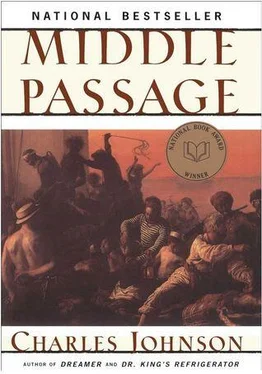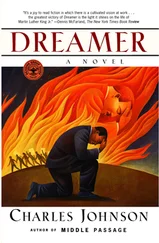On ship I decided against my usual signatures of defiance: pooping amiddlemost a local politician’s satin pillow, for example, or fabricating for his wife — some blue-blooded snob — a love letter from their black chambermaid that was worthy of James Cleveland, or simply scrawling on their parlor wall in charcoal from their hearth, as I often did, “I can enter your life whenever I wish.” No, I did none of this, there in Falcon’s quarters. All I wanted was to know his heart (if he had one) and to walk off, as was reasonable, with a tradable trinket or two.
I drifted from object to object at first, just touching things with sweat-tipped fingers as a way to taint and take hold of them — to loose them from their owner — but ever more slowly, for I soon found that Falcon’s room was ingeniously rigged with exploding, trip-lever booby traps. He’d filled ordinary rum bottles on his shelf with liquid explosives (each detonated by a pull-friction fuse in the cork), and two of his calabash pipes had stems packed with gunpowder. Also he kept all the ship’s weapons in his cabin under lock and key. These security measures (or perhaps they spoke of Falcon’s insecurity) I expected, but not what I found next. His biggest crates of plunder from every culture conceivable, which he covered with tarp at the rear of the room, were wrenched open, spilling onto the sloping floor bird-shaped Etruscan vases, Persian silk prayer carpets, and portfolios of Japanese paintings on rice paper. Temple scrolls I found, precious tablets, and works so exotic to my eyes that Falcon’s crew of fortune hunters could have taken them only by midnight raids and murder. Slowly, it came to me, like the sound of a stone plunked into a pond, that he had a standing order from his financiers, powerful families in New Orleans who underwrote the Republic, to stock Yankee museums and their homes with whatever of value was not nailed down in the nations he visited. To bring back slaves, yes, but to salvage the best of their war-shocked cultures too.
More carefully, then, I moved on, slipping a few doubloons down the front of my blouse, and even more into the crotch of my breeches. The moon’s pull on waves beneath us rocked the ship so suddenly I was thrown off balance and cracked my head on a crossbeam. Then I found his chart table with my kneecap. After striking a match, I saw his journal winged open to pages written in the cramped yet even script we associate with scriveners, each page more unusual than the last, revealing in this age of tepid personalities a Faustian man of powerful loves, passions, hatreds: a creature of preposterous, volatile contradictions. From what I was able to piece together, the nation was but a few hours old when Ebenezer Falcon was born, its pulpits and work places and pubs buzzing with talk of what the new social order should be. He was the only child of a close-mouthed Nantucket minister, one of the Sons of Liberty, and a pale, lonely woman of polite education who could discuss with her husband neither the books she loved nor theater, politics or her past in the colonies. Therefore, she poured stories about El Dorado and the Fountain of Youth, her feelings and fantasies into Ebenezer. She placed maps before him, and music boxes; like most doting mothers of this sort, she lived vicariously through her son. For his part, Falcon grew up determined to outperform his father (and most other men) and bring her gifts from all the lands she would never see. He was that sort of son. Aye, small enough to miss in a crowd, but with the bantam spirit for fighting and overcompensating that many men of slight stature possess. Her death when he was fifteen, off on his first stint as a cabin boy, changed nothing; he, like the fledgling republic itself, felt expansive, eager to push back frontiers, even to slide betimes into bullying others and taking, if need be, what was not offered. Needless to say, he made enemies. Under another name, one of his several aliases, he was wanted for murder or treason in three states. The first charge was produced by a duel at daybreak over gambling debts in Philadelphia; the second by a proposition he had made during the last war to Anthony Merry, the British minister in Washington, to divide the western region of the continent into empires separate from the United States, one of which the skipper hoped to shape himself, establishing there not a kingdom — for he hated men like George III — but a true American utopia, a dream nurtured by more than one man after the Revolution. By nature he was anti-British, and anti-Jeffersonian as well after the ill-planned Embargo Act that threw seamen and shipbuilders out of work, and he agreed more than any sane man should with Pierre-Joseph Proudhon’s devilish idea that social conflict and war were, in the Kantian sense, a structure of the human mind. These feelings he shared only with a few co-conspirators who had served with him under Captain William Bathbridge when their ship, the Constitution, engaged the British frigate Jaya off the coast of Brazil and battered her into submission. These were friends injured, as he was in that battle, and passed over for commissions. Embittered, they saw the war against England as mismanaged, an embarrassing study in military blunders so astonishingly stupid (the nation did nothing to upgrade its fleet, so merchantmen with muzzle-loading cannons strapped on their decks single-handedly took on the world’s greatest navy) that the only sane course for common sailors who valued their skin was to escape being used as cannon fodder and to profit as best they could from international confusion. As it turned out, the time for slaving was good, boosted by the South’s cotton boom after planters adopted Whitney’s cotton gin and the demand for Negro slaves doubled. No matter that in 1808 the trade was outlawed. Like so many others with a seaworthy ship and crew of grumbling tars disillusioned by their country’s inability to keep the seas free from piracy and British impressment, Falcon turned to piracy himself, then to a contraband market that many these days served clandestinely. In other words, in a dangerous world, a realm of disasters, a place of grief and pain, a sensible man made himself dangerous, more frightening than all the social and political “accidents” that might befall him. He was, in a way, a specialist in survival. A magister ludi of the Hard Life.
The man who emerged in these journal entries possessed a few of the solitary virtues and the entire twisted will of Puritanism: a desire to achieve perfection; the loneliness, self-punishment, and bouts of suicide this brings; and a profound disdain for anyone who failed to meet his nearly superhuman standards. He attributed his knack for survival in uncertain times to a series of exercises he’d developed, written in Latin, French, and Greek — for he thought simultaneously in all three languages — under the heading “Self-Reliance.”
Outside, shoe leather struck the deck near Falcon’s door. Someone coughed, then cursed the skipper safely since he was not there, and I recognized his voice as that of the boatswain, Matthew McGaffin. Long seconds passed while McGaffin pissed on Falcon’s door, expelling the sea within himself; then he moved drunkenly on, and I read of our captain’s personal regimen — training himself to read six lines of any book in one snap, to work while others slept, to withstand extremes of heat and cold in case of shipwreck, to find everything in his cabin blindfolded, to ignore pain, to live on as little as a single biscuit, and to do calisthenics to strengthen his eyes and make bifocals unnecessary. Culture, in his view, came from an Icarian, causa sui impulse I found difficult to decipher. Not surprisingly, he saw himself as profoundly misunderstood, his deeds as terribly underrated. According to one day-old notation, the demands he made on others had someone plotting to kill him — he suspected first Squibb, then Cringle — by dropping arsenic and thallium sulfate into his dinner, though this could simply be the mistrust of an unpopular captain who kept knives concealed in every cabin, and whose imagination, I swear on this, was artistically limited to the finely wrought workmanship of pistols, the blunt simplicity of well-balanced, hand-crafted weapons. Maybe the reason for this was his being a natural marksman. From birth he’d lacked binocular vision. All his life he’d been squinting shut his left eye, so that when someone put a pistol in his hand at eighteen, he naturally sighted his targets and began blowing them away effortlessly. Yet, for all this obsession with survival, he had the air of a man who desperately wanted to die, which made his position on ship — his power over the others — all the more frightening.
Читать дальше












